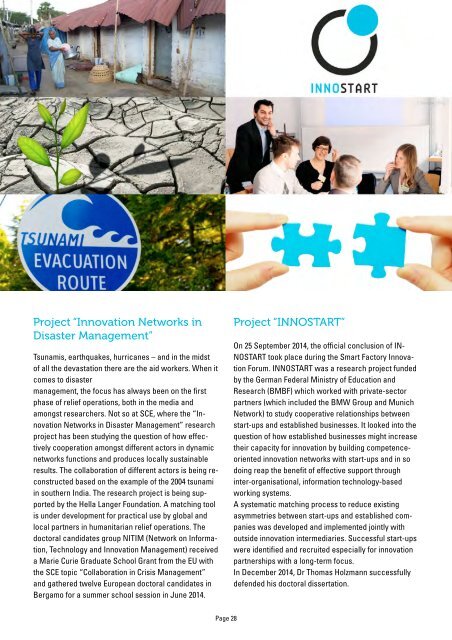SCE Annual Report 2014/15
You also want an ePaper? Increase the reach of your titles
YUMPU automatically turns print PDFs into web optimized ePapers that Google loves.
Research<br />
<strong>SCE</strong> supervises theses<br />
(bachelors and masters)<br />
of students at the Munich<br />
University of Applied Sciences<br />
and FOM.<br />
For topics please visit<br />
www.sce.de/en/bachelormaster.<br />
Project “Innovation Networks in<br />
Disaster Management”<br />
Tsunamis, earthquakes, hurricanes – and in the midst<br />
of all the devastation there are the aid workers. When it<br />
comes to disaster<br />
management, the focus has always been on the first<br />
phase of relief operations, both in the media and<br />
amongst researchers. Not so at <strong>SCE</strong>, where the “Innovation<br />
Networks in Disaster Management” research<br />
project has been studying the question of how effectively<br />
cooperation amongst different actors in dynamic<br />
networks functions and produces locally sustainable<br />
results. The collaboration of different actors is being reconstructed<br />
based on the example of the 2004 tsunami<br />
in southern India. The research project is being supported<br />
by the Hella Langer Foundation. A matching tool<br />
is under development for practical use by global and<br />
local partners in humanitarian relief operations. The<br />
doctoral candidates group NITIM (Network on Information,<br />
Technology and Innovation Management) received<br />
a Marie Curie Graduate School Grant from the EU with<br />
the <strong>SCE</strong> topic “Collaboration in Crisis Management”<br />
and gathered twelve European doctoral candidates in<br />
Bergamo for a summer school session in June <strong>2014</strong>.<br />
Page 28<br />
Project “INNOSTART”<br />
On 25 September <strong>2014</strong>, the official conclusion of IN-<br />
NOSTART took place during the Smart Factory Innovation<br />
Forum. INNOSTART was a research project funded<br />
by the German Federal Ministry of Education and<br />
Research (BMBF) which worked with private-sector<br />
partners (which included the BMW Group and Munich<br />
Network) to study cooperative relationships between<br />
start-ups and established businesses. It looked into the<br />
question of how established businesses might increase<br />
their capacity for innovation by building competenceoriented<br />
innovation networks with start-ups and in so<br />
doing reap the benefit of effective support through<br />
inter-organisational, information technology-based<br />
working systems.<br />
A systematic matching process to reduce existing<br />
asymmetries between start-ups and established companies<br />
was developed and implemented jointly with<br />
outside innovation intermediaries. Successful start-ups<br />
were identified and recruited especially for innovation<br />
partnerships with a long-term focus.<br />
In December <strong>2014</strong>, Dr Thomas Holzmann successfully<br />
defended his doctoral dissertation.<br />
NITIM<br />
The <strong>SCE</strong> has been a part of the Graduate School NITIM<br />
(Network on Information Technology and Innovation<br />
Management) since it became a founding member in<br />
2005. As a European research association, NITIM offers<br />
an attractive basis for an international academic career<br />
in the field of technology, innovation and social development.<br />
In the research workshop, doctoral students meet with<br />
professors from multiple disciplines to discuss their<br />
research projects. The doctorate can be earned as an<br />
outside Ph.D. at the University of Leiden. The regional<br />
Ph.D. colloquium takes place once a month in Munich.<br />
Summer and winter school sessions are held twice a<br />
year at alternating European universities.<br />
In June <strong>2014</strong>, Christina Weber, director of the <strong>SCE</strong> research<br />
department, delivered a lecture at the NITIM<br />
International Graduate School in Bergamo, Italy. She<br />
presented the actor-network theory derived from her<br />
research on the rapid emergence and dynamic development<br />
of actor networks in disaster relief and reconstruction.<br />
(See also p. 28.)<br />
For more information please visit www.nitim.org.<br />
DBA<br />
Page 29<br />
The “Doctor of Business Administration” (DBA) is<br />
another option for those seeking a doctor’s title. The<br />
DBA is an application-oriented doctoral programme<br />
designed with the needs of business and industry in<br />
mind. A special feature of the DBA is its rigorously focused<br />
and modular scientific approach and is therefore<br />
ideal for those working full-time and wishing to earn a<br />
doctorate. The <strong>SCE</strong> and the Munich University of Applied<br />
Sciences offer this extra-occupational doctorate<br />
in close cooperation with the Edinburgh Napier University,<br />
the Waterford Institute of Technology (WIT) and<br />
the University of South Wales. The first three doctoral<br />
students began working towards their doctorates at<br />
Edinburgh Napier University in the 2013-<strong>2014</strong> winter<br />
semester. The cooperation with WIT has been on-going<br />
since the <strong>2014</strong>-20<strong>15</strong> winter semester. Eight doctoral<br />
candidates are currently completing the programme.<br />
The programme is designed to be completed in three to<br />
four years on an extra-occupational basis, so that the<br />
first class of DBA candidates at <strong>SCE</strong> will be graduating<br />
in 2016. The supervising professors are Prof. Dr. Klaus<br />
Sailer (<strong>SCE</strong>), Prof. Dr Thomas Peisl (FK10), Prof. Dr.<br />
Christian Greiner (FK07).
















